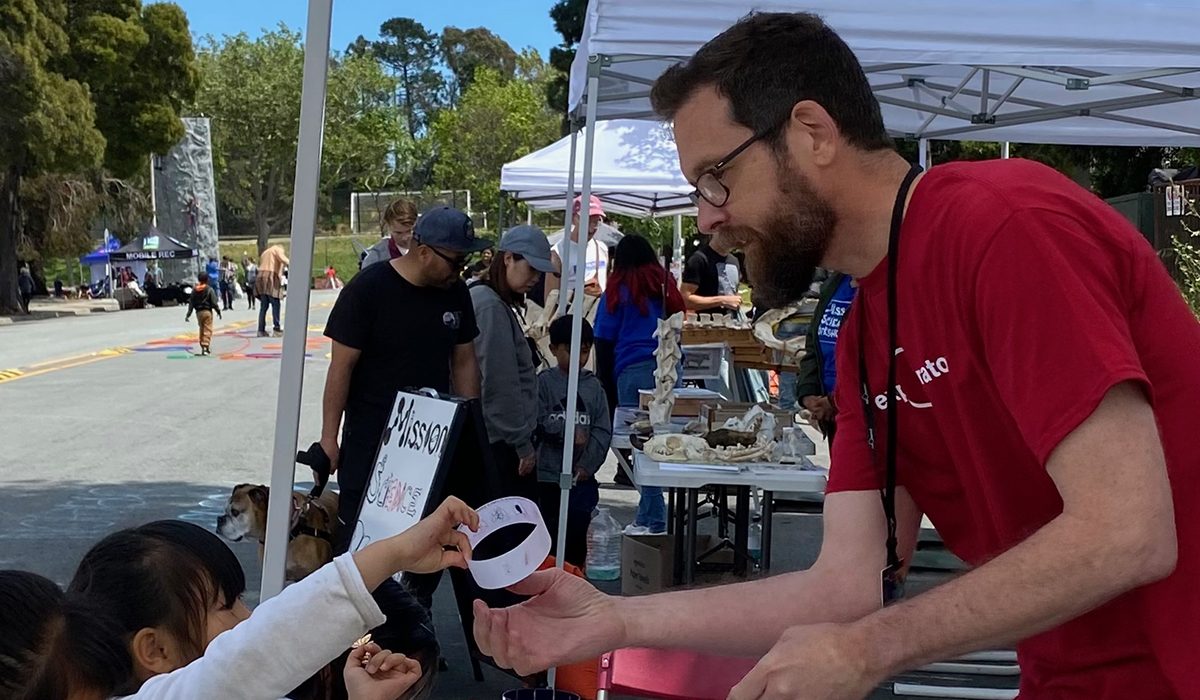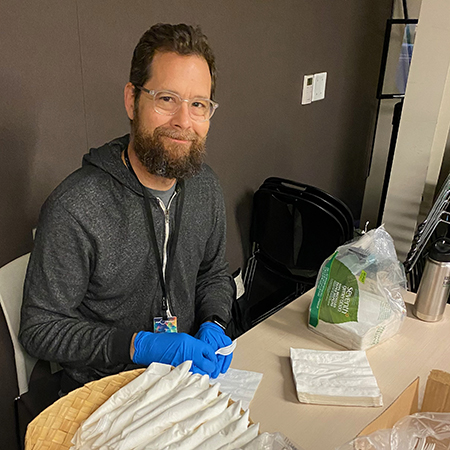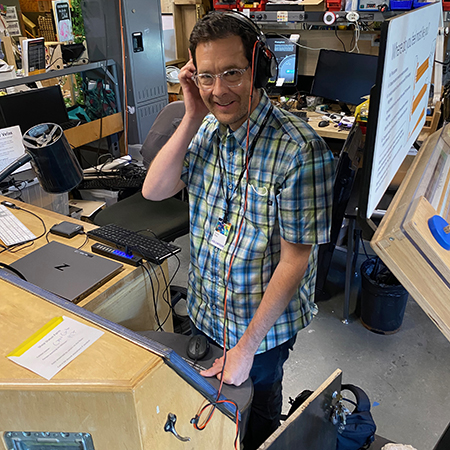Designing a Different Kind of Retirement

Meet Daily Point of Light Award honoree David Bliss. Read his story, and nominate an outstanding volunteer or family as a Daily Point of Light.
The COVID-19 pandemic led many to make big changes and reevaluate their lives. After a fruitful career as a UI designer and software developer, including working in Amazon’s Devices and Design group and leading his own design studio, 54-year-old David Bliss did the same. Looking to make a more direct impact on people’s lives, he started volunteering and retired early to invest more time in community involvement. Simultaneously, he began curating a little free yard library with science fiction and reestablishing his childhood hobby, sailing.
His first foray into volunteering was with the Exploratorium a museum that lets visitors explore the world through science, art and technology. Four years later, he averages 65 hours a month serving a combined estimate of 650,000 yearly visitors of all ages. Shortly after starting there, David also joined Code Nation for five months of mentoring high school students in computer science. And as a long-time baking enthusiast, he found a great fit in Community Loaves, an organization that brings together volunteer bakers to make bread and energy cookies for those facing food insecurity.
David is early in his volunteer journey but is already making future plans. His story is a reminder that change can be good. He’s accomplishing his goal of building meaningful connections in roles he wouldn’t have even dreamed of before taking the leap.

What inspires you to volunteer?
At Amazon, I did a lot of prototyping next-generation products, spending time working on things that were hard to imagine improving people’s lives. Only a few became real products.
In mid-2021, shortly after my dad passed away and my mom came to live with us, I decided to step back from that career and reevaluate. There were a lot of life changes for me during that time that caused me to examine how I was spending my time. I was looking for something that put me more directly in touch with the end consumer of whatever I was working on.
I thought I might go into STEM education and was figuring out what that might look like when I found the Exploratorium. I started volunteering and realized that I could just slot in there to meet a lot of my goals.
When I was in high school, we didn’t have a volunteering requirement, so I wasn’t exposed to the benefits. I launched my own business after graduating which kept me hyper-focused for 25 years. The Exploratorium is my first serious volunteer effort. I also started baking about seven years ago and got more into it during the pandemic. So, when I came across Community Loaves last year, I signed up.
Tell us about your volunteer role with Exploratorium and Community Loaves.
At the Exploratorium, I support a variety of events, predominantly San Francisco Sunday Streets run by Living Cities. They set up a booth with five or six activities for people to engage in and learn about the museum. The goal is to reach people who might not otherwise come into the museum, speaking to them about challenges faced in the community. There might be something about climate change or animal life in San Francisco, sometimes something specific to the neighborhood. We spark curiosity. Our annual Pi Day is full of events at the museum. I serve pie, organize people in the parade and help with anything from set up to clean up.
A lot of the exhibits have a digital component, so I also work with the new media exhibit development group. I update ones that have been taken off the floor because either they’ve stopped working or need to be updated. I work on their underlying code base and rehabilitate them. Last year, I started working on two new exhibits with exhibit developers that are in the summer program right now, called Adventures in AI.
I’ve baked 237 loaves of sandwich bread for Community Loaves so far. I’m the Berkeley hub leader. Once a loaf cools, you package it and either take it to a freezer bank or freeze it at home. Approximately every two weeks, you bring donations to the hub and then they’re taken to the food bank.
Last year, a team of people developed two new recipes. As a test baker, I gave feedback throughout the process as they were revised. Now, those are available to 920+ bakers in the Community Loaves network across multiple states.
What are your long-term plans or goals within the context of this work?
My goal at Exploratorium is to continue developing activities for street fair visitors. The Exploratorium has had a table at Sunday Streets since I started. Previous kits were for things like automatas and zoetropes. I also want to find new venues to use them either within the museum or at other public events.
My goal with Community Loaves is to bake more loaves in the time that I have. And I’m always looking to recruit more willing bakers.

What’s been the most rewarding part of your work?
I like developing activity kits and sitting down with one or two kids at a time to talk about them. They pick one to build, take it home and show their friends and family what they learned. That’s the most personally rewarding, because it’s what I wanted to do when I started thinking about a change, to be able to work with people more directly and see the interest firsthand.
What have you learned through your experiences as a volunteer?
There are a lot of great organizations that have done a lot of work behind the scenes to make it easy for someone like me to just show up, give my time and make a difference. One thing I wish I would have learned earlier is how easy and rewarding it can be to participate. You don’t have to wait until you have a lot of time. You can put in as little or as much time as you want. And it’s never too early or too late to be more generous with your knowledge and talents.
Do you want to make a difference in your community like David? Find local volunteer opportunities.